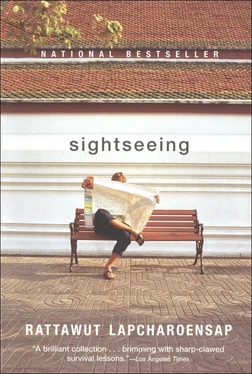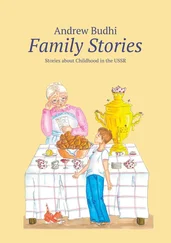For our part, Dong and I got better with the bike. We managed to pop a couple of wheelies, though the diving board trick was still far out of reach. “You guys are so stupid,” Priscilla would say, watching us work up the courage to try again.
“That’s the dumbest thing I’ve ever seen.” But then she’d laugh so hard after we fell that it was almost worth risking our necks just to hear her guffaw.
When it got too hot we’d go to Priscilla’s shack. Her mother cleaned houses in the nicer development down the road from ours — where the Thicknecks frolicked in their Olympic-sized community pool — but on days off Priscilla’s mother would often make sticky rice for us. There was never more than that, no fish or pork or anything, but the rice felt good and substantial to have in the stomach. Priscilla’s mother watched us eat impassively and the three of us would teach her a few Thai phrases. Dong and I taught her how to swear in Thai. We’d laugh because there was nothing funnier than hearing a flat-faced Cambodian refugee woman saying “Dickwad” and “Fuckface” and “Hairy beaver.”
That’s when we learned about Priscilla’s name. She was named after Elvis Presley’s wife. One of the few possessions her mother brought with her was an LP showing Elvis’s fat farang mug framed by those thick bushy chops. The record sat on top of a milk crate, propped against the dirty tin wall like a centerpiece to a shrine, and although Priscilla said she’d never heard the record — they didn’t own a player — her mother had done renditions during nights at the camps to get her to sleep. Dong and I looked at the LP cover and said we didn’t understand how anybody could think the guy was handsome. If he grew up in Bangkok he wouldn’t be king of anything. The Thicknecks would probably call him names. He’d be no better than the rest of us plebes. “Look at the guy,” we said. “He’s wearing a cape.”
Aside from the Elvis record, there was also a small picture of Priscilla’s father taped above the moth-eaten pallet she shared with her mother every night. In the picture, Priscilla’s father stood before a massive concrete building wearing light green hospital scrubs. He had large, clunky glasses, stared intently at something outside the frame. “Now that guy there,” we told Priscilla. “That guy’s handsome. Elvis is puke compared to that guy.” Priscilla believed her father was still alive. We weren’t about to suggest otherwise.
The Cambodian shanty grew just as Father predicted. They really did move in packs. There were four, then six, then eight shacks and near the end of the summer there must have been thirty Cambodians living across the railroad tracks bordering our housing development. Their tiny houses leaned haphazardly against one another; from afar their shanty looked like a single delicate structure made of crinkled tin cards. Like Priscilla and her mother, they were mostly women and children, though a few dark, gaunt men appeared as well. The Cambodians never seemed to say much to each other, and when they did they spoke in hushed tones, as if being refugees also meant being quiet. They might turn blue with laughter or gesticulate wildly or get angry at each other, but they always seemed to do so at half the normal human volume. During the evenings they chatted, kicked around a takraw ball, sewed blankets and pillows, tended to the herb garden they’d started planting in the knoll. Dong and I never spoke to any of them, but we thought it was nice the way they nodded or waved or smiled when we came by on our bikes.
Every morning a white pickup truck would arrive to take some of the Cambodians to work at a road construction site. They’d pile in back, bunched together so close there wasn’t any room to sit. Once, Dong and I got up early enough to see this, and there was something about the faces of those Cambodians going to work that nearly broke our hearts in half. Their quiet anxious expressions said they weren’t sure they were coming back. They looked at their dilapidated little world by the railroad tracks as if for the very last time. The truck would drop them off in the early evening and they would all be there, of course — nothing to worry about at all — and it was almost understandable to me how they could look relieved to be back at such shitty little shacks. Surviving each day seemed a victory and a wonder to them.
Two of Priscilla’s teeth came out that summer. The first was a lateral incisor, close to her front teeth. She cried all day when she discovered it loosening from her gums. “I don’t know what to do,” she said, a finger holding the tooth in place. By that time Dong and I were already veterans of the ordeal. We told her not to worry. We told her it was natural. “I don’t care if it’s natural,” she said, and then she cried and cried some more. We spent most of the morning consoling her. We told her to imagine the things she and her mother would be able to buy with the gold. A television. A record player. A refrigerator. But she said she didn’t want anything. “It’s my tooth,” she said. “It’s mine.” Then I told her it had probably been her father’s plan all along — he probably thought Priscilla and her mother would need the gold to find their way home to him — and the idea seemed to console her momentarily.
A week later, the tooth came out at last. We were sharing a bag of fishballs at the pool when Priscilla suddenly spat the tooth into her hand. We stared for a while at that ingot sitting in a small pool of spittle and blood and masticated fish, then Priscilla wiped it off and passed it around. The tooth didn’t seem so brilliant outside of her mouth. It just looked like a shiny little pebble, impossibly light in my hand. We took the tooth back to Priscilla’s mother and she put it away in a teakwood box next to Elvis Presley’s portrait.
The housing development’s decline became painfully visible, just as my parents had predicted. For the first time the development company didn’t bother to fill the gaping potholes created by the wet-season floods. There were so many craters in the roads Mother said she was beginning to think we lived on the moon. She said, “Dear God, I really don’t care about the health club or the pool or the community garden anymore, I just want to ride my bike to the bus stop without breaking my goddamn neck.”
More rats started appearing as well. There were so many of them by the end of the summer that Mother could not have prevented them from getting to our trash even at her angriest. I watched in horror one evening as a mangy, mean-looking stray nosed a sewer grate outside our house only to scurry away frightened when three rats came lumbering out to greet her. “It’s an invasion out there,” Mother said. “It’s a goddamn rat apocalypse.” Father set poisoned rat-paper in the outdoor kitchen every other night. In the morning, there’d always be two or three rats, large as small kittens, squealing and moaning, struggling against the glutinous surface like demonic little dinosaurs dying in some tar pit.
Dong said rats were super-horny. He’d seen some documentary about it on television. One rat, he said, can make up to fifteen thousand little rats in a single year. Priscilla laughed and said this was nothing. “This is easy,” she said. She told us that at one of the camps things got so bad people went to sleep hugging a stick just in case.
We discovered a rat in the pool one day. It had fallen in and couldn’t find a way out. We stood at the edge of the pool staring at the hideous red-eyed thing prancing around. We didn’t know what to do. So we wandered aimlessly for the rest of the morning. Dong seemed so upset about the rat I thought he’d start crying. But when we went back later that afternoon it was gone. We never saw a rat in there again. But the pool was different for us after that.
Читать дальше











